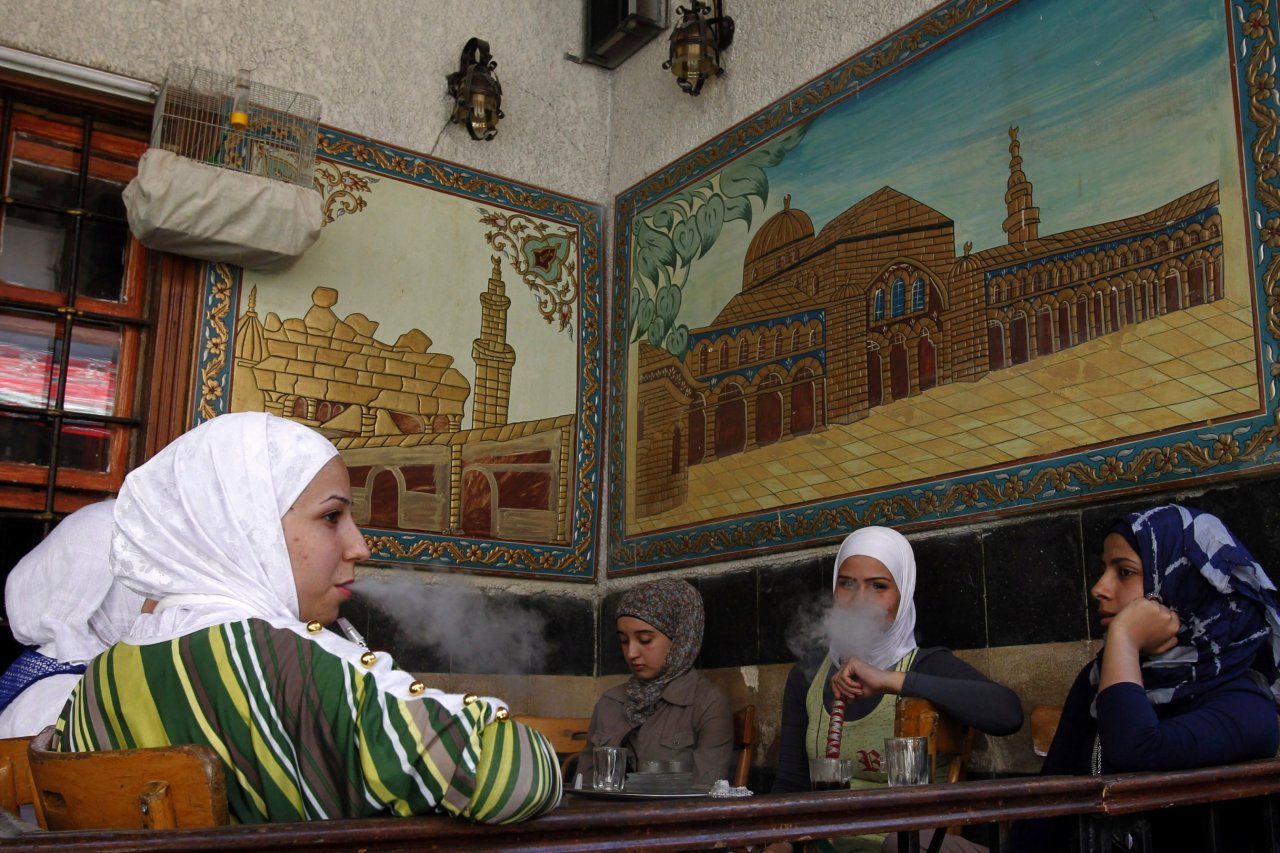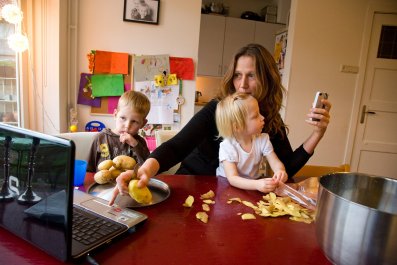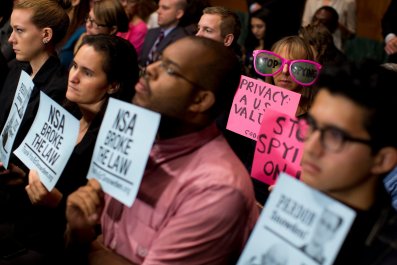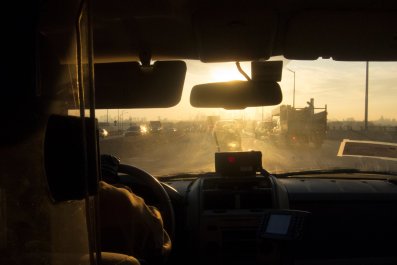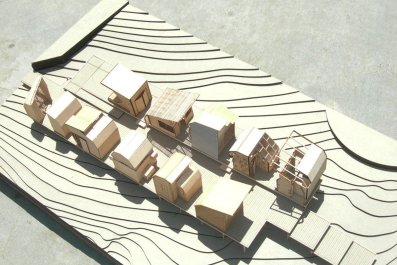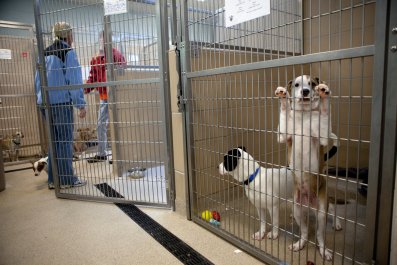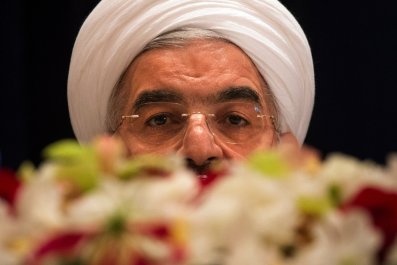A lot of Syrians would call Fatima lucky. And in some ways, at least, she would have to agree. The mother of four and her family fled their hometown a year ago, making their way from the embattled Damascus suburb of Moadamiyeh to the comparative safety of the capital itself. There they found a basement apartment in the building where Fatima's husband now works as a superintendent. Schools are in session here, and there's food in the shops. That's more than the friends and relatives who stayed behind in Moadamiyeh can say.
Fatima and her family got out just in time. Even as they left, Bashar al-Assad's government was in the process of laying siege to the town. Today it's surrounded by heavily armed soldiers who allow no food, medicine, or humanitarian aid of any kind to enter. No one – man, woman, or child – from inside can leave. Everyone who lives there is presumed to be a rebel sympathizer. Truth be told, by now the government's brutal tactics have indeed driven most of the remaining inhabitants into the opposition's ranks.
Last month Fatima learned that a distant cousin of hers had starved to death in Moadamiyeh. He was three. According to the Associated Press, at least six residents of the besieged Damascus suburbs have died in the past few weeks, including an 18-month-old. U.N. statistics say upwards of 4 million Syrians, half of them children, are in need of emergency food aid; a report from Save the Children warns that the actual number is probably far higher.
Fatima is well aware that she and her family are far better off than many of the country's roughly 5 million internally displaced persons. (She and the other Syrians named in this story don't want their full names used, for fear of government reprisals.) Her family has a modest but comfortable place to live, and she supplements her husband's income by working occasionally as a housekeeper. Many other displaced Syrians can only shuttle from town to town, doing their best to stay a step ahead of government air raids and waves of ground bombardment from both rebel and government artillery.
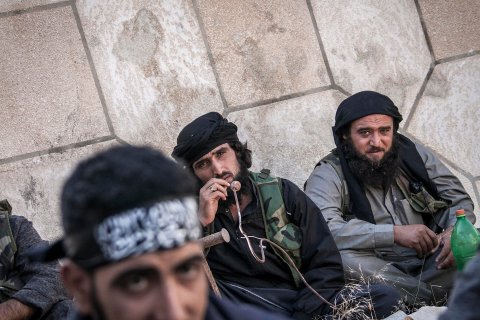
Just about everyone in Syria feels trapped. Except in two or three small, safe neighborhoods, anyone in the capital who ventures out after dark is asking for trouble. Kidnappings, carjackings, and forced disappearances have become commonplace, and they're all the more terrifying in a city that until two years ago was practically free from random violence. Even going out for an early dinner in the city's ancient historic district can be risky – in recent months, mortar shells have detonated in and around the neighborhood. Depending on the vagaries of government checkpoints and subsequent road closures, visitors heading home from the Old City may be forced to make a detour around the entire city, wending their way through sniper alleys and deserted streets near the front lines.
As a result, many Damascenes now spend their days and nights barricaded in their own apartments. When friends come over, they smoke shisha – hookahs of sweetened tobacco – and make small talk, although their circumscribed lives give them little to discuss beyond the latest complaints. They suffer from depression, weight problems and family tensions.
Fatima has moments when she can forget her troubles, but most of the time her thoughts won't stop racing. The prices of food and school supplies have quadrupled in the past year – will they ever go down? Is her old house back in Moadamiyeh still standing? What if her husband gets picked up at a government checkpoint, like so many other men from Syria's centers of rebellion? Will their eldest son be accepted to the university? If not, he'll be drafted into the Army – and these days, that's as good as a death sentence.
At least her marriage looks solid. The war has taken its toll on almost every couple, whether or not they have managed to avoid physical injuries. Many extended families have doubled or tripled up in the capital, taking in relatives driven from their homes elsewhere in the country. Wasid, 42, says life in the Damascus suburb of Itseya became too dicey for him and his wife, so they moved in with his parents in the capital. Now the pair and their kids have gone back to their old place, despite the town's perpetual street crime and rebel shootouts. "It's not the best place to live and raise our kids, but had we stayed at my parents', I would have lost either my wife or my mother," says Wasid. "They were fighting over everything, from what to cook that day to how to dress our kids."
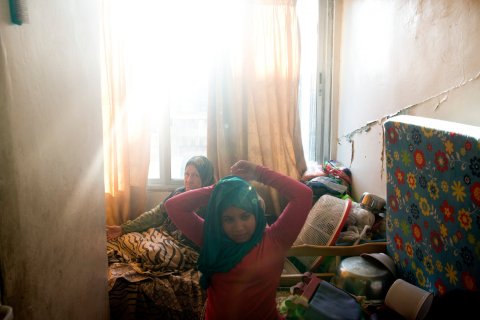
Not everyone finds bunking with the in-laws so difficult. Yasir, a personal trainer and physical therapist, says he and his wife, Huda, have been quite amicably shuttling back and forth between the central-Damascus homes of their respective parents for the past few months, ever since the fighting drove them out of their own home in Itseya. They're hurting anyway – literally, in Huda's case. "My wife has developed stress-related ailments, like shoulder pain that we can't figure out," says Yasir. "And her jaw and teeth hurt despite wearing a night guard."
Yasir says the war has almost put him out of a job. In the past year, as many of Syria's more prosperous families have left the country, Yasir's client list has dwindled to the single digits. With little work to do, he says his life has become that of "a bored housewife." "I'm home most of the time, so I end up spending the hours chitchatting with the women of the house and watching soap operas," he says. "I've gained a lot of weight, and I'm very annoyed with myself."
When he goes to the gym, the slackers he sees drive him crazy. At the half-dozen gyms that remain open in Damascus, membership rolls have actually grown. Prices have doubled in the past year, to the equivalent of roughly $20 a month, but customers seem more than willing to pay. "I don't recall seeing the gym so crowded," he says. "But it's just because people hardly have anywhere to go. It's frustrating for me as a trainer – they join to socialize, not to work out, and the minute they step outside, they light up a smoke or go out to a shisha bar. And then they eat junk food."
At least it gets them out of the house. Kinda, a gregarious 47-year-old, says her social life these days is confined almost entirely to her family's private home in the middle-class neighborhood of Rukn al Din. "Before my husband comes home from work – that's when I like to host my women's gatherings," she says. "Most of them are my neighbors. We fix up the shisha and make tea and put out the desserts and fruit, and then we sit around and chitchat." Her 11-year-old daughter, Yara, nods and smiles mischievously. "Yeah," she says. "They puff and smoke, and they're all really fat." Then she giggles at her own boldness.
Fatima has no such problems. She says this month alone she's dropped six kilos (13 pounds). She doesn't know why. "I think it's just nerves," she says, spreading the sides of the now baggy dress she's wearing. "Every time I get on the scale, I find that I'm thinner." She can only hope it's the stress of the war that's eating her up, and not some undiagnosed illness. Then she thinks about her old friends and neighbors back in Moadamiyeh, and she counts her blessings.



